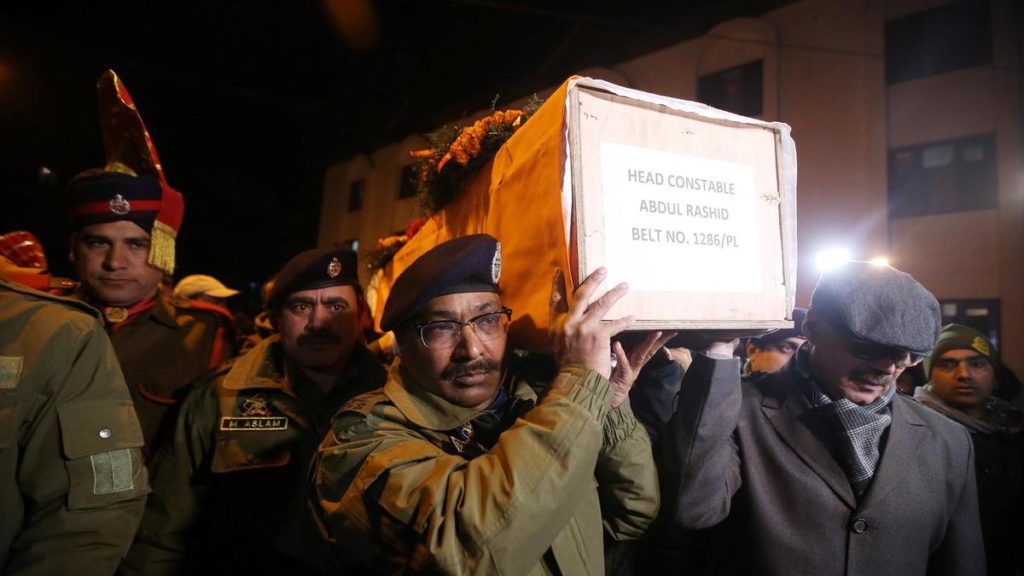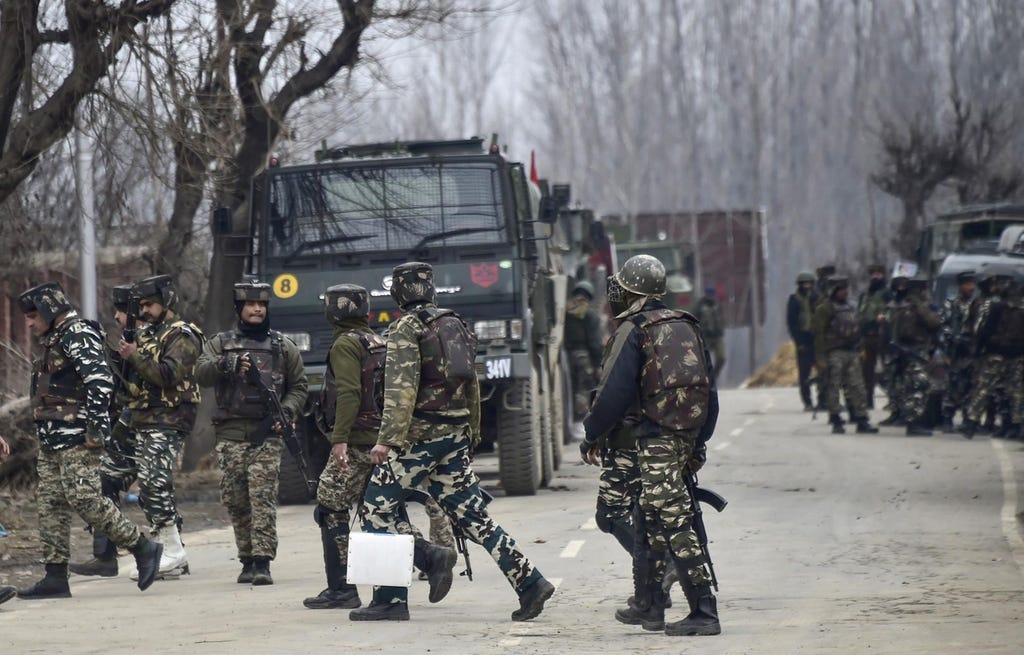The intensity of India’s anger makes it harder to hear calm voices

Indian police officers carry the coffin of their fallen colleague, who was killed in a gun battle between suspected militants and security forces in south Kashmir’s Pulwama district. Danish Ismail / Reuters
India and Pakistan have returned to a level of hostility not seen in decades after the attacks in Pulwana in Kashmir
India and Pakistan are engaged in verbal warfare once again, exchanging increasingly provocative jibes at one other’s perfidy. It would be a miracle — and a blessing — if the aggression between the nuclear-armed neighbours stayed at this level. Last Thursday, a suicide bomber in a car packed with explosives struck a paramilitary convoy in Indian-administered Kashmir, killing 44 soldiers. The attack in Pulwama, the single deadliest against Indian security forces in Kashmir in decades, was quickly claimed by the Pakistan-based Jaish-e-Mohammad (JeM), a group designated a terrorist entity by the United Nations and the US in 2001. It was followed in Pulwama yesterday by a gun battle involving suspected JeM militants, in which nine people — including four soldiers and a policeman — died. JeM’s claim to be behind the attack led India to accuse its neighbour of an attempt to “destabilise”. Even as Pakistan denied state complicity, Indian prime minister Narendra Modi promised a “befitting…jaw-breaking response” and both countries recalled their ambassadors.

Over the past few days, the Indian public’s grief over its dead has solidified into cold, hard anger. As coffins arrived in villages and towns across the country, funerals drew many thousands of mourners and political activists, who orchestrated chants against Pakistan. Television anchors positioned themselves as the most patriotic Indians of all, leading emotionally charged discussions about the pending “crushing” riposte to Pakistan. Senior retired Indian army officers took to the airwaves to call for a “permanent or semi-permanent” solution to India’s problem with Pakistan. Social media, awash with patriotic tributes to the “martyrs”, expressed impatience for the Indian authorities to “act”. Irate Facebook posts demanded India show “guts… the guts of Israel which dealt with Hamas; or the guts of Sri Lanka which eliminated LTTE; or Myanmar when it dealt with Rohingyas”.
It has started to look a bit like life imitating art, or at least like contemporary cinema. A new Indian film, titled Uri — The Surgical Strike, dramatises the aftermath of the 2016 attack on an army base in Kashmir, which killed 17 Indian soldiers. Although no group claimed the assault, India blamed Pakistan and crossed the line of control to launch a series of attacks on Pakistani posts. The film has become a hit in India, its jingoistic depiction of events resonating after Pulwama. Mr Modi’s Bharatiya Janata Party has seized on a question posed by the film’s hero to Indian military recruits: “How’s the josh?”, which refers to zeal or enthusiasm for battle. This has stoked expectations of more hardline actions against Pakistan. After Pulwama, it has become an anthem, a slogan of intent.
As coffins arrived in villages and towns across the country, funerals drew many thousands of mourners and political activists, who orchestrated chants against Pakistan
The militaristic fervour, ahead of Indian elections scheduled for April and May, suggests that relations between India and Pakistan are set to return to a level of hostility not seen for decades. Already, India has withdrawn Most Favoured Nation trade privileges from Pakistan and imposed 200 per cent customs duties on all imports. Although the impact is likely to be limited — bilateral trade is minimal on account of accreted animosity — the action was a reminder of how much more dysfunctional the relationship can get.
And Pulwama seems to be driving a stake into the heart of the broader relationship between the people of both countries. This has often centred on cricket, a shared passion. But soon after Pulwama, the Cricket Club of India covered over a portrait of Imran Khan, now Pakistan’s prime minister but formerly a greatly admired sportsman in cricket-mad India. A major Indian broadcast production company withdrew from Pakistan’s ongoing marquee cricket event, the Super League. And as a tweet crowed this week, the popular news website Cricbuzz “has stopped covering the PSL and has deleted all Pakistan-related content on its site following Pulwama attack”.
The message of such small acts of celebration over perceived Pakistani humiliation is not edifying. Nor is it conducive to peace breaking out any time soon. Indeed, the militaristic intensity of India’s justifiable anger and pain at the tragic loss of lives is making it hard to focus on ground realities, or even to hear calmer Indian voices.
What they’re saying is unambiguous. For instance, retired army commander, General DS Hooda, who oversaw the 2016 strike against Pakistan after Uri, urged “some introspection, some deep thinking and engagement to do everything afresh”. And Happymon Jacob, an academic who specialises in the Kashmiri conflict at Delhi’s Jawaharlal Nehru University, has drawn attention to the larger numbers of educated, aspirational Kashmiri youths joining the insurgency compared to 2013, the year before Mr Modi came to power. By extrapolation, Mr Modi’s hardline policing strategy with respect to Kashmir has created a new indigenous resistance, one that draws on a broader swathe of society.
What this means is obvious. More people in Indian-administered Kashmir are resentful of Indian attempts to control and direct their energies. More Kashmiris are angry with India. Clearly, New Delhi needs to pursue a more empathetic, hearts-and-minds strategy for Indian-administered Kashmir.
Of course, none of this is to discount Pakistan’s role in feeding the insurgency in Kashmir. Indeed, Islamabad has been manifestly unwilling to clamp down on extremist groups such as JeM, Jaish al-Adl (Army of Justice) or the Pakistani Taliban. In theory, this should be enough leverage for India to push for wider international condemnation of — and action against — Pakistan for apparently providing safe harbour to entities espousing a violent agenda in several countries.
But “how’s the josh?” works best in a film script. In real life, what’s needed is the hard graft of building peace in a difficult space.

